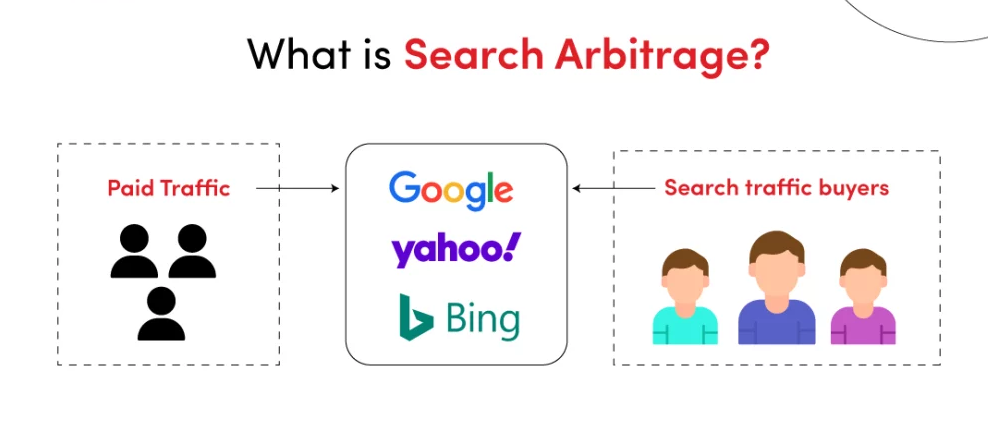How to Start a Search Arbitrage Business? Starting a Search Arbitrage Business is an exciting and potentially lucrative opportunity in the digital marketing landscape. This article provides a comprehensive, step-by-step guide on launching and managing a successful search arbitrage business, covering everything from understanding the basics of search arbitrage, identifying profitable niches, setting up your platform, and optimizing ad performance.
Whether you’re a beginner looking to enter the world of digital entrepreneurship or an experienced marketer seeking to expand your revenue streams, this guide offers actionable insights, practical tips, and expert advice to help you thrive in the competitive world of search arbitrage. Learn how to leverage the power of search engines, create compelling ad campaigns, and turn clicks into profits. Discover the strategies to help you rank high on Google, maximize your return on investment, and build a sustainable business model that can scale over time.

Understanding Search Arbitrage: How to Start a Search Arbitrage Business
Search arbitrage is a business model that involves purchasing low-cost traffic from one source and redirecting it to another source where you can monetize it for a higher price. The concept hinges on the difference between the cost per click (CPC) of acquiring traffic and the revenue generated per click from advertisers. Simply put, you buy traffic at a lower rate and earn more by selling that traffic to a higher bidder. This traffic arbitrage can be highly profitable if executed correctly, but it requires a deep understanding of how search engines and advertising networks work.
The first step in starting a search arbitrage business is to grasp the fundamentals. Search arbitrage is primarily about leveraging the discrepancies in traffic costs across different platforms. For instance, you might buy traffic from a low-cost source like Google Ads using less competitive keywords and then direct that traffic to a landing page with higher-paying ads from networks like Google AdSense or affiliate offers. The key to success lies in balancing the cost of acquiring traffic and its revenue.
At this stage, it is crucial to conduct deep market research. Identifying niches with low competition and high profitability can make or break your business. Tools like Google Keyword Planner, SEMrush, and Ahrefs can help you analyze keyword trends, search volumes, and competition levels. The goal is to find keywords with low CPC but highly relevant to monetizable content.
Setting Up Your Platform
Once you have a solid understanding of the basics, setting up your platform is the next step. This involves creating a website or landing page where you’ll direct the traffic you acquire. Your platform should be optimized for speed, user experience, and conversions. A slow-loading website can significantly impact your revenue, as users are less likely to stay on a page that takes too long to load.
Consider using a reliable hosting provider and a content management system (CMS) like WordPress to build your site. WordPress is highly customizable, SEO-friendly, and has many plugins to enhance your website’s functionality. Ensure your site is mobile-responsive, as a significant portion of web traffic comes from mobile devices.
Design your landing page with conversion in mind. Use clear and compelling calls-to-action (CTAs), and make sure your content is relevant to the ads displayed. The alignment between your content and the ads is crucial for maintaining a high click-through rate (CTR). The higher your CTR, the more revenue you’ll generate.
Driving Traffic to Your Site
With your platform in place, the next focus should be on driving traffic. Several methods to acquire traffic include paid search, social media advertising, and content marketing. Paid search, especially through platforms like Google Ads, is a common choice for search arbitrage due to its targeting capabilities.
When running paid search campaigns, choosing the right keywords is important. Long-tail, more specific, and less competitive keywords can be a goldmine for search arbitrage. These keywords often have a lower CPC and can attract highly targeted traffic. Regularly monitor and optimize your ad campaigns to ensure the best ROI.
Social media advertising on platforms like Facebook, Instagram, and Twitter can also be effective, especially if you’re targeting a specific demographic. Content marketing, on the other hand, involves creating valuable content that attracts organic traffic. While this approach takes more time to generate results, it can provide a steady stream of traffic over the long term without the ongoing cost of paid ads.
Monetizing Your Traffic
Monetization is at the heart of search arbitrage. Once you’ve driven traffic to your site, the next step is to convert that traffic into revenue. Several ways to monetize your traffic include display ads, affiliate marketing, and lead generation.
Display ads, such as those from Google AdSense, are a popular choice for monetization. These ads pay you every time a visitor clicks on them, making them ideal for search arbitrage. To maximize your earnings, experiment with ad placements and formats. Ads placed above the fold or in high-visibility areas tend to perform better.
Affiliate marketing is another powerful monetization strategy. Promoting products or services relevant to your audience can earn commissions on any sales generated through your affiliate links. The key to success with affiliate marketing is to ensure that the products you promote align with your audience’s interests.
Lead generation involves collecting contact information from visitors and selling it to businesses seeking new customers. This method can be particularly lucrative in the finance, insurance, and real estate industries, where businesses are willing to pay a premium for high-quality leads.
Optimizing Ad Performance
Optimizing your ad performance continuously is essential to maximizing your profits in search arbitrage. This involves testing different ad formats, placements, and targeting options to find the best for your audience. A/B testing, where you compare two versions of an ad to see which performs better, is a common optimization method.
Pay attention to metrics like CTR, CPC, and conversion rate. A high CTR indicates that your ads are resonating with your audience, while a low CPC means you’re acquiring traffic at a lower cost. Conversely, the conversion rate shows how well your landing page is converting visitors into customers or leads.
It’s also important to monitor the performance of your traffic sources. If buying traffic from multiple sources, compare their performance to identify which ones provide the best ROI. You might find that certain traffic sources are more profitable than others, allowing you to allocate your budget more effectively.
Scaling Your Business
Once you’ve established a profitable search arbitrage business, the next step is scaling. Scaling involves increasing your investment in traffic acquisition, expanding into new niches, or both. The goal is to grow your revenue without significantly increasing your costs.
To scale successfully, reinvest a portion of your profits back into your business. This could mean buying more traffic, hiring a team to help manage your campaigns, or investing in tools that automate certain aspects of your business. As you scale, it’s important to maintain a close eye on your metrics to ensure that your ROI remains positive.
Expanding into new niches can also be a profitable way to scale. Use the same market research techniques you used initially to identify new opportunities. Remember that each niche requires a tailored approach, so be prepared to adjust your strategy accordingly.
Compliance and Ethical Considerations
As with any business, operating ethically and complying with all relevant laws and regulations is important. In search arbitrage, this means ensuring that your ads and landing pages do not violate the terms of service of the platforms you’re using. For example, Google has strict policies regarding the content of ads and landing pages; violating these policies can result in your account being suspended.
Transparency with your audience is also crucial. Avoid using misleading tactics to drive traffic or clicks. Not only is this unethical, but it can also damage your reputation and lead to penalties from advertising networks.
Additionally, respect the privacy of your visitors. If you collect data, ensure that you do so in compliance with privacy laws such as GDPR or CCPA. Provide clear information about how data will be used and allow users to opt-out.
Staying Ahead of the Competition
The search arbitrage landscape constantly evolves, and staying ahead of the competition requires continuous learning and adaptation. To stay informed, keep up with the latest trends in digital marketing, search engine algorithms, and advertising technologies by joining forums, attending webinars, and reading industry blogs.
Innovation is key to staying competitive. Experiment with new traffic sources, ad formats, and monetization strategies. By continually testing and optimizing, you can find new ways to improve your business and stay ahead of competitors who may be using outdated methods.
Frequently Asked Questions
What is search arbitrage?
Search arbitrage is a business model that involves buying low-cost traffic from one source and monetizing it at a higher rate on another platform. The profit comes from the difference between the cost of acquiring traffic and its revenue.
How do I start a search arbitrage business?
You’ll need to understand the basics of how search engines and advertising networks work. You’ll also need to set up a platform, drive traffic, and optimize ad performance. Start with market research to identify profitable niches and then create a website or landing page to monetize your traffic.
What tools do I need for search arbitrage?
Essential tools for search arbitrage include keyword research tools like Google Keyword Planner, SEMrush, and Ahrefs. You’ll also need a website builder like WordPress, a reliable hosting provider, and an advertising platform like Google Ads. Analytics tools such as Google Analytics are also important for tracking performance.
How do I drive traffic to my site?
You can drive traffic to your site through paid search, social media advertising, and content marketing. Paid search is often the most direct method, using platforms like Google Ads to target specific keywords. Social media ads can also be effective, especially for targeting specific demographics. Content marketing involves creating valuable content that attracts organic traffic.
How do I monetize my traffic?
Monetization methods for search arbitrage include display ads.

